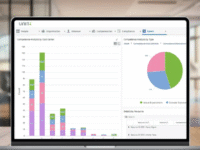How AI & Machine Learning Is Changing the Way We Do Marketing?

Since artificial intelligence (AI) was first introduced, it is easily recognisable how this development has changed the way people interact and engage with brands. As a result, marketers need to learn how to adapt rapidly to the changing landscape of the tech system. While predicting the future is not something anyone can do, it’s important to stay ready and know what to expect in the coming years.
On the one hand, it allows for faster and more efficient responses to customers. On the other, many brands struggle to cope with the quick-paced cycle of this technology. That’s why to better understand how AI is transforming the way businesses promote their products and services, here’s a list of some of the most apparent changes that are currently taking place in the different types of digital marketing channels.
The Rise of Voice Search
As the world is transitioning to a more compact and mobile interface, it shouldn’t come as a surprise to see how people are switching to hands-free search. With this coming along, it’s pretty visible how AI-powered virtual assistants are increasing in use. With the continuous advancements in human speech machine learning algorithms, the appearance of voice search seems to be the most obvious solution. In fact, since its introduction, consumers have easily shifted their attention to it to find everything they need.
This trend has forced brands to adjust their search engine optimisation (SEO) and content marketing strategy to align with voice search. This means that search engines of today favour businesses that allow their algorithm to translate what’s written on the web.
More Specific Audience Targeting
Convincing your target audience is the most essential part of marketing. But how do you persuade these people to buy and look at what you’re offering? With AI, this idea is now possible. Virtual assistant technology comes with predictive consumer segmentation to give customers a more personalised experience. Through data gathering and tracking, it’s easier for virtual assistants to identify which type of service or product a consumer is most interested in. Simply put, AI has provided business owners with the power to capture people’s attention after a few simple interactions.
Promotes Better Customer Engagement
One of the biggest advantages AI has brought to digital marketing is its predictive and highly analytical data gathering system. No matter how massive the volume of data it collects, AI can easily collect and examine all of those to predict how the customer will make a decision and/or behave. In addition, it is possible to make it an intuitive tool to find out what people are searching for. By understanding this, it’ll be easier for businesses to improve the level of engagement their visitors have with their brand.
If you translate this, a higher interaction rate means an increase in customer satisfaction and brand loyalty. Aside from improving customer engagement, AI-driven tactics have the ability to drive better conversions when applied correctly.
Offers Augmented & Virtual Reality
Augmented reality (AR) and virtual reality (VR) in this day and age are no longer a novelty. Many brands are looking into adapting this idea as it focuses on highlighting the experiential value of what they’re offering. While its application is not as widespread as with other AI-driven techniques, like voice search, virtual assistants, chatbots, etc., sooner or later, it will dominate the world of digital marketing.
There are in fact, a few businesses that succeeded through the use of AR & VR. American Express’ air tennis and IKEA Place allow their customers to place the brand furniture virtually into their homes. With the continuous development of this particular technology, it’s safe to say that people can expect to see more and better improvements in the near future.
AI technology has brought a lot of things to the digital marketing sphere. Its continuous development plays a massive role in transforming many brands and levelling the playing field among businesses. It’s important you know how to keep up with these changes, otherwise, you’ll get easily swallowed by the amount of available data and techniques surrounding AI.





